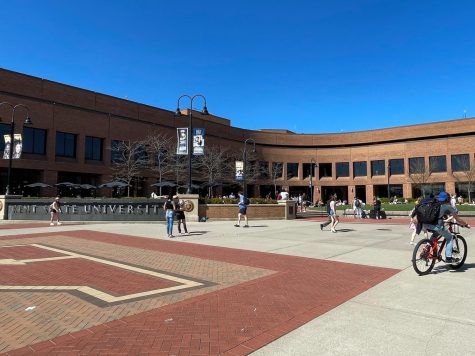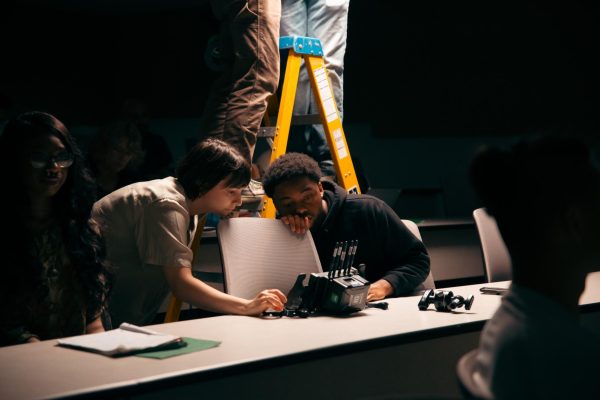Faculty work to finalize universal restroom policy, ensure comfort for all
February 28, 2017
After years of effort made by Kent State faculty, staff and students, a policy guaranteeing the construction of universal restrooms in all new campus buildings is in the works.
Despite the increase in universal restrooms throughout the campus over the years, there is currently no written policy enforcing construction. The university’s faculty members are working to change that.
Getting the ball rolling
Michael Bruder, executive director of facilities, planning and design, said there was an increase in universal restroom construction five to eight years ago. Bruder has been part of universal restroom construction from the beginning.
The first universal restroom Bruder knew of was built in the Student Center around 2008 or 2009.
“We saw a pattern of this need for universal restrooms coming forward from different people like the Division of Diversity, Equity and Inclusion (DEI), who are really aware of transgender people, and then I think through the Student Accessibility Services (SAS),” he said.
Bruder said the department thought of combining different needs to one initiative that serves multiple people.
“It wasn’t really a singular person who started the drive for universal restrooms, but it was certainly encouraged to make our campus more inclusive and welcoming,” he said.
Bruder has only been able to build universal restrooms during major renovations of buildings or bathrooms.
Jacqueline Gee, a lecturer in the modern and classical language department, was the first to ignite the fire behind the accessibility of universal restrooms in 2013.
Gee said her boss, Student Ombuds Amy Quillin, was asked by the Office of the University Architect to have Gee take a look at a shower being built for transgender students. Quillin then gave her a file containing notations of locations on campus that were determined Safe Spaces by the LGBTQ Student Center.
Gee – then an employee of SAS – saw the information and was inspired to work on a bigger concept.
“I started looking at the file, and I thought, ‘Wow, you are asking people to travel long distances to find a safe place to go,’” Gee said.
She said she wanted to create a safe and private space for everyone.
“There are a lot of reasons that people want to be alone,” Gee said. “There are survivors of sexual assault who feel uncomfortable in public restrooms and we tend to forget the people who have irritable bowel syndrome or those that have a feeding tube.”
“Thinking about those unrepresented voices and looking at the map, it seemed like we needed a different strategy,” she said.
When Gee first became involved, the bathrooms were referred to as “family restrooms.” Her first action was to change the word from “family” to “universal.”
“I started looking at all the family restrooms and realized that it doesn’t really match our current population,” Gee said. “How many families do we really have walking around campus? If we were to rename them, what would still work for families?”
Gee worked with the university and the Americans with Disabilities Act (ADA) Committee. She also reached out to the Women’s Center and Alfreda Brown, vice president for Diversity, Equity and Inclusion (DEI). Brown authorized Gee’s name change suggestion.
“If we call them universal, then everyone will look at that and go, ‘That meets my needs,’” Gee said.
The name change became effective in 2014. Gee then devised a map of the universal restrooms on campus.
She brought in Ken Ditlevson, LGBTQ Student Center director, and Dianne Kerr, health sciences professor and provost’s faculty associate for DEI, into the project.
In 2015, Gee, Ditlevson and Kerr went on a tour of every building on campus to scout for potential universal restroom locations.
“You wouldn’t believe how many bathrooms there are at Kent State,” Ditlevson said. “It was really time intensive and not something that you would ever think of as a job, but it’s important to know the layout of the campus.”
“We found some crazy things,” Kerr said. “Like bathrooms that just had curtains for privacy.”
Ditlevson said there were roughly 30 universal restrooms before the tour. Now, there are 48, not including residence halls.
Policy process
Kerr is in charge of writing the policy that will be added to the policy registrar after it is approved. She has been working on it for a few years.
“I’m working on the policy so that it states that every new building that is put in and every major renovation includes a universal restroom as well,” Kerr said.
Ditlevson, Bruder and Heather Adams, executive director of the Women and Gender Center, have been working with Kerr on the policy. The Division of Diversity, Equity and Inclusion has also aided Kerr.
“I’m working with a lot of different people, which presents itself as a challenge when you send out a draft to everybody, and they all want to make little changes,” Kerr said. “But we want it to be right. It’s not like you write a policy and it immediately goes in.”
Kerr’s policy must be approved by Brown before moving on to be approved by the president’s Cabinet.
Brown was contacted for comment, but said she was not yet ready for an interview on the subject. She said she first wanted to meet with those involved in order to finalize the next steps of the process.
Student involvement
Kent PRIDE! and the Undergraduate Student Government (USG) have also contributed to the fight for universal restrooms. The organizations worked together to create a gender-friendly initiative, which included the FlashLine name change and gender inclusive housing.
According to Ditlevson, PRIDE! and USG joined forces two years ago and met with administration to propose their initiative.
Gabrielle Cooper, president of PRIDE!, said she is happy with the efforts made to assist the LGBT community.
“We talked with the administration about how it’d be helpful to trans students and to make people more comfortable while using the bathroom,” Cooper said. “A lot of times, trans people fear going to the bathroom that they want to go to in, in fear of being bullied or assaulted. That’s a privilege that cisgender people have — we don’t have to think about that.”
A Personal Perspective
This increase of universal restrooms and policy affects a wide range of people — transgender or disabled — as well as anyone who wants a place of privacy.
Riley Braun, a sophomore anthropology major, identifies as a non-binary transgender male.
He said he has issues with finding a restroom he feels comfortable using.
“It’s hard when you walk up to a bathroom and see the guys and girls bathroom and you freak out about which one you should go in,” Braun said. “And then you finally see a universal restroom and you’re like, ‘This one I know I’ll be fine going in. I know that I will be accepted in here. I know that it’s completely open to people who are transgender or of any gender identity.’”
Braun is an intern at the LGBTQ Student Center. The only universal restroom in the building is on the third floor.
“I don’t want to go all the way up to the third floor, especially from the basement, so I don’t go to the bathroom,” he said. “I know a lot of people who don’t go. They wait until they go back to their dorms or to a universal restroom, or they have someone go with them.”
Braun expressed the difficulty of how something as simple as going to the bathroom can be a dangerous and threatening environment for a transgender person.
“As a transgender person, you don’t know what bathroom to go in because you either get yelled at or possibly beaten up,” Braun said. “You never know what you’re going to get.”
“Personally, trying to find a restroom is just really hard. When in doubt for me, I go into the female restroom. I get a lot of stares from people — and sometimes glares and side looks — but it’s better than going to the men’s restroom and not knowing what’s going to happen. It’s better for me to be uncomfortable and go to the bathroom quickly and then run out, than be very uncomfortable and afraid for my physical well-being.”
Braun said he is hopeful for the policy and happy that Kent State is making an effort to be more LGBT-friendly.
“I’m hopeful that Kent State will try their best with it. They’ve already switched over some bathrooms and made others more accommodating,” he said. “I love that Kent State is trying to take the steps forward towards making life more comfortable for transgender people.”
Trump’s announcement
Last Wednesday President Donald Trump rescinded the Obama administration’s guidelines holding up protections of transgender people, as well as the ability for them to use any bathroom they choose in schools.
By removing the federal protections, individual states and schools are able to decide how much to protect transgender students.
Trump’s announcement caused fear for some transgender students, including Braun.
“I was immediately more afraid than I had been previously,” he said. “I knew that this was going to happen, but I wasn’t thinking so soon.”
Ditlevson also commented on Trump’s announcement and its potential effect on Kent State’s campus.
“It won’t affect the policy of us having universal restrooms,” Ditlevson said. “It would just be a matter of whether in the general public, there’d be that layer of protection. But no one wants to go into a bathroom and be called out or humiliated, and so this guidance was really to protect students and to protect individuals.”
An article published by Kent State on Feb. 13 reinforces the university’s stance of support for inclusive restrooms, citing information given by Bruder:
“To date, there are 48 universal restrooms on the Kent Campus. Bruder also said whenever the university is building a new building or doing a major restroom renovation, Kent State now includes at least one universal restroom in the building. Recent building projects in White Hall, University Library, the Center for Undergraduate Excellence and the Center for Architecture and Environmental Design included universal restrooms as part of the renovation or new construction.”
While Trump’s removal of the Obama administration’s guideline won’t affect the universal restroom policy, it could affect how transgender people are protected on campus.
“I’m so disappointed that this came. We should all be standing up for each other when our rights are taken away and violated. For the LGBTQ community, it makes us really fearful of everything that might be coming next. This is so early on, and he’s shaken so many things up. It’s very unsettling,” Ditlevson said.
As for the policy’s status, Kerr is still perfecting it.
“I’m just happy that (the university) has identified places and for a matter of the health of our trans population here,” Kerr said. “It’s just another step in making Kent (State) a more welcoming place for everybody.”
McKenna Corson is a diversity reporter, contact her at [email protected].























